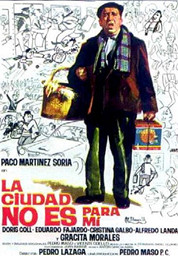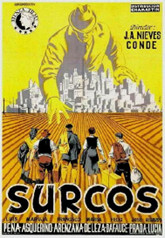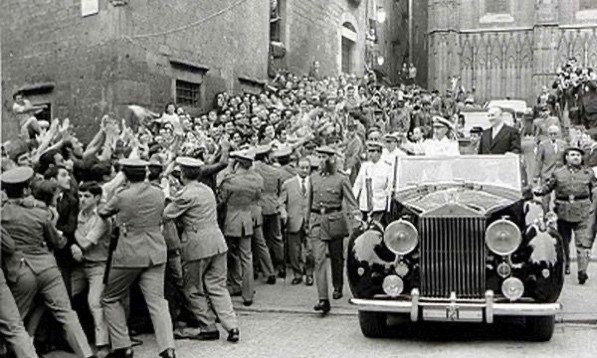Organizers
Research projects of the National R&D Plan:
Urban society in Spain, 1900-2000. Madrid, from capital to metropolitan region (PID2022-136744NB-C31)
& Francoist regionalism from Catalonia: practices and centripetal discourses (PID2021-125227NB-I00)
First session
Friday, October 4, 2024, from 10 a.m. to 7 p.m., Faculty of Geography and History, Complutense University, Madrid
Second session
Friday, October 18, 2024, from 10 a.m. to 7 p.m., Room U0.3, U Building, Poblenou Campus, UOC, Barcelona
 The Franco dictatorship is going to develop parallel to a new phase of the urbanization process of Spanish society. The outcome of the Civil War will mean a retreat from historical supplies with respect to the advances of modernity achieved by urban society in the first third of the 20th century. The repression, the autarchy, the ans of the family and the reactionary values of the national Catholicism mean that the great transformation led by the great cities was abruptly interrupted. The recovery of some indicators to the fifty-five pre-war levels, recovered by the end of autarchy, economic liberalization and North American aid, means that the recovery acquires speed, in line with the growth of the postwar European economy. The great cities are going to become scenes of the economic-industrial transformation of the country, of the social and cultural evolution with the expansion of the mitjanes classes and the application of Franco’s policies, the liberalizing airs of which they will be strong limitations of the autocratic character and the reactionary values of the dictatorship.
The Franco dictatorship is going to develop parallel to a new phase of the urbanization process of Spanish society. The outcome of the Civil War will mean a retreat from historical supplies with respect to the advances of modernity achieved by urban society in the first third of the 20th century. The repression, the autarchy, the ans of the family and the reactionary values of the national Catholicism mean that the great transformation led by the great cities was abruptly interrupted. The recovery of some indicators to the fifty-five pre-war levels, recovered by the end of autarchy, economic liberalization and North American aid, means that the recovery acquires speed, in line with the growth of the postwar European economy. The great cities are going to become scenes of the economic-industrial transformation of the country, of the social and cultural evolution with the expansion of the mitjanes classes and the application of Franco’s policies, the liberalizing airs of which they will be strong limitations of the autocratic character and the reactionary values of the dictatorship.
 This development coexisted with dimensions not so apt for the propaganda showcase. On the one hand, the great metropolises did not escape the consequences of political repression, poor economic management (autarchy, famine, corruption…) and the tensions generated by successive waves of migration (shanty towns, inequality, urban growth…). On the other hand, the complicity built between the regime and various citizen sectors to consolidate itself had its counterpart in an opposition that knew how to pass the baton from the survivors of the post-war generation to the new protest movements, where the range of demands and organisations covered sectors as diverse as the workers, the neighbourhood, the students, the professionals or the Catholics. Economic growth, external openness (with a prominent role for emigration and tourism), the restart of the consumer society (interrupted during the post-war period), new demands and values of the urban middle classes and, above all, of the new generations collided with the narrow limits of the dictatorship, which widened the channels of protest in cities in an accelerated process of expansion, in which the problems associated with the social and spatial inequality of the Spanish metropolises acted as motors of opposition to the dictatorship on the political, social and cultural levels of an urban society that recognized itself more in the democratic European welfare societies than in the stale moral rhetoric and social inequalities of the dictatorship.
This development coexisted with dimensions not so apt for the propaganda showcase. On the one hand, the great metropolises did not escape the consequences of political repression, poor economic management (autarchy, famine, corruption…) and the tensions generated by successive waves of migration (shanty towns, inequality, urban growth…). On the other hand, the complicity built between the regime and various citizen sectors to consolidate itself had its counterpart in an opposition that knew how to pass the baton from the survivors of the post-war generation to the new protest movements, where the range of demands and organisations covered sectors as diverse as the workers, the neighbourhood, the students, the professionals or the Catholics. Economic growth, external openness (with a prominent role for emigration and tourism), the restart of the consumer society (interrupted during the post-war period), new demands and values of the urban middle classes and, above all, of the new generations collided with the narrow limits of the dictatorship, which widened the channels of protest in cities in an accelerated process of expansion, in which the problems associated with the social and spatial inequality of the Spanish metropolises acted as motors of opposition to the dictatorship on the political, social and cultural levels of an urban society that recognized itself more in the democratic European welfare societies than in the stale moral rhetoric and social inequalities of the dictatorship.
First session
Post-war, autarky, repression and famine.
A setback of historical scope, 1939-1953
Friday, October 4, 2024, from 10 a.m. to 7 p.m
Faculty of Geography and History, Complutense University, Madrid

10:00 Conference The politics of hunger by Miguel Ángel del Arco Blanco (University of Granada)
11:30 Breakfast break
12:00 First panel: Post-war in the city, coordinated by Gutmaro Gómez Bravo (Complutense University) with the participation of:
- Daniel Oviedo (Public University of Navarre); Joan Roger (UPC); Maria Eugènia Jaume (UOC & UIB); & Alfonso Martínez Foronda i Pedro Sánchez Rodrigo
13:30 Lunck
15:00 Second panel: Autarky in the city, coordinated by Nuria Rodríguez Martín (Complutense University), with the participation of:
- Manel Guàrdia (UPC); Marc Gil Garrusta (UOC); Alejandro Pérez-Olivares (University of La Laguna); & David Martínez López, Manuel Martínez Martín & Ana Belén Gómez Fernández (Universities of Granada & Jaén)
16:30 Coffe-break
17:00 Third panel: The first urban society, coordinated by Ana Rodríguez Granell (UOC), with the participation of:
- Mireia Capdevila Candell (CEDID-UAB & Fundació Carles Pi i Sunyer); Borja Iglesias (UPC); Jon Aldabaldetrecu Delgado (UPV); & Francisco Javier Muñoz i Mará Jesús Pacho (UPV)
18:30 Closure
Second session
An authoritarian modernity
Urban transformations and citizenship in construction (1953-1975)
Friday, October 18, 2024, from 10 a.m. to 7 p.m
Room U0.3, U Building, Poblenou Campus, UOC, Barcelona

10:00 Conference Urbanism under the Francoism: from the regional plan of 1953 to the general plan of 1974/76. The contrast between planning and urban reality by Joan Busquets Grau (ETSAB-UPC, Martin Bucksbaum Professor de la Universitat de Harvard)
11:30 Breakfast break
12:00 First panel: The seams of urban planning, coordinated by Jaume Claret (UOC) with the participation of:
- Charlotte Vorms (University of París 1 Panthéon-Sorbonne); Andrew Dowling (University of Cardiff); Maribel Rosselló (UPC); & Pedro A. Novo López & Susana Serrano Abad (UPV)
13:30 Lunch
15:00 Second panel: Culture under the franco’s regime, coordinated by Muriel Gómez (UOC), with the participation of:
- Ana Martínez Rus & José María López Sánchez (UCM); Joana Maria Pujadas (UOC); Maria Llombart Huesca (University of Paul Valéry Montpellier 3); & Joan Fuster-Sobrepere (UOC)
16:30 Coffe-break
17:00 Third panel: The end of the dictatorship, coordinated by Ricardo Robledo (UOC), with the participation of:
- Oriol Nel·lo (UAB); Anna Catharina Hofmann (University of Martin Luther Halle); José Luis Oyón (UPC); & Luis Enrique Otero Carvajal (UCM)
18:30 Closure
